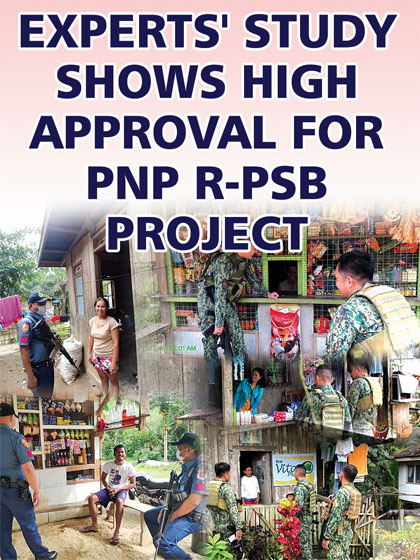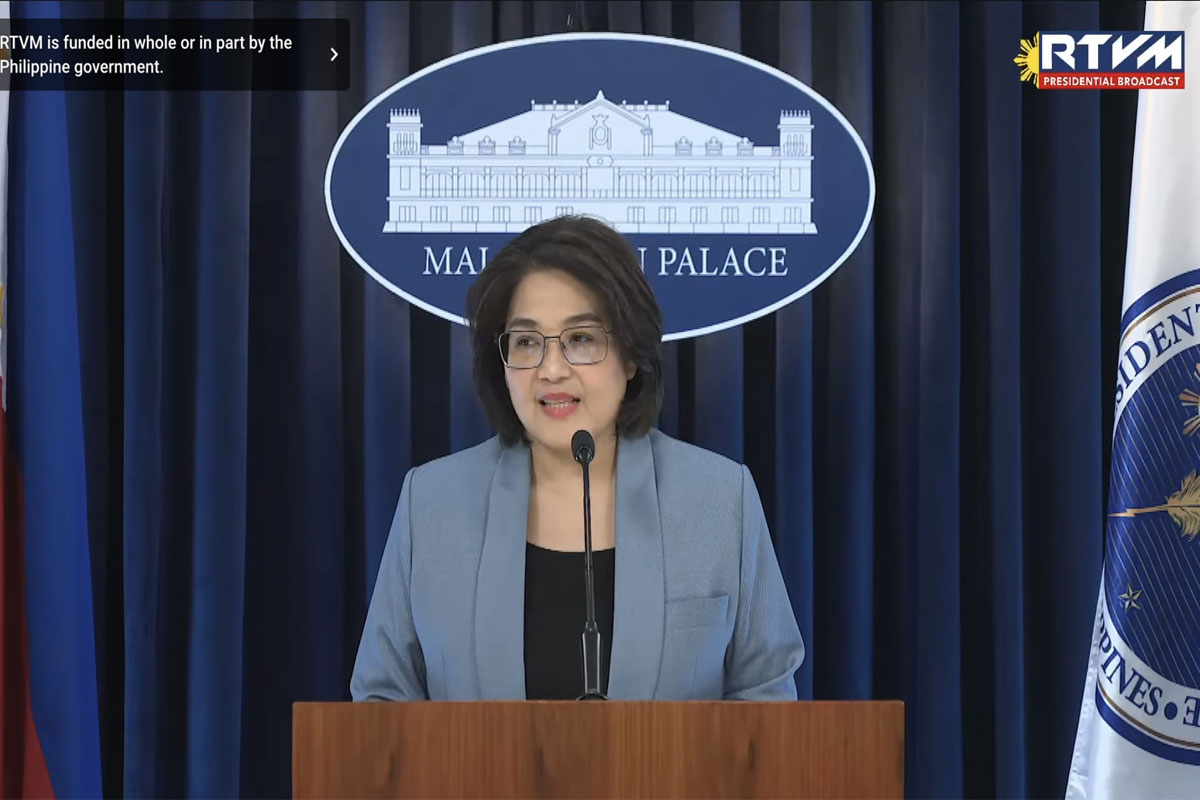
Experts’ study shows high approval for PNP R-PSB project
 A STUDY made by a group of academic experts from Mindanao has recognized the value of the Revitalized-Pulis sa Barangay (R-PSB project) in Davao region in helping address threats posed by insurgents and criminals altogether, the Journal Group learned yesterday.
A STUDY made by a group of academic experts from Mindanao has recognized the value of the Revitalized-Pulis sa Barangay (R-PSB project) in Davao region in helping address threats posed by insurgents and criminals altogether, the Journal Group learned yesterday.
The study made by Adrian M. Tamayo, Hamlet Lerios, Napoleon Carpio, Mohammad Hashim T. Sahidaini and Jesus Juevesano centered on the R-PSB or the public safety strategy which combines internal security and community and involved a total of 620 survey respondents who are implementers of the program.
It showed that there is an evident high degree of knowledge about the program and wide level of willingness to serve in the R-PSB program knowing that the program directly interacted with the community by providing basic infrastructures like roads, water system, livelihood and social services in so-called Geographically Isolated and Depressed Areas (GIDAS) in Southern Mindanao.
The respondents said they affirm to be the symbol of governance in those areas even though they discussed factors that hamper the full implementation of the program including pessimism by some of their colleagues on the R-PSB, the lack of information and communication, the perils of deployment and last but not the least, capacity-building.
Academes from the University of Mindanao, Mindanao Development Authority, Philippine Public Safety College, National Police College and the Bukidnon State University participated in the study on how effective the R-PSB is when it comes to addressing the insurgency threat and community-policing in Region 11.
The study said that on the whole, “the community policing cum internal security program of Philippine National Police Region 11 earned an overall assessment of 90.67 percent.”
It added that the success factors of the R-PSB are “willingness to volunteer (positive effect), R-PSB implementation mechanism (positive effect), Information and Education (positive effect), Perils of Deployment (positive effect), Conduct of Briefing (positive effect), Community Resilience (positive effect), Community Development (positive effect), Governance Credibility (positive effect), Making Sense of R-PSB (negative effect). Except with the Making Sense of R-PSB, all other variables contribute to the success of rating of the R-PSB.”
The study focused on the question ‘What are the police for?’ Officials admitted that the decades-old communist and Muslim insurgencies in the country has caused a major setback in the development and economic progress of The Philippines as well as the continued socio-economic divide between the rich center and the poor rural villages.
It also said that countering insurgency is really a serious and big task on the part of the government for it would indeed require huge manpower and logistical resources. In the country, police are usually left to mingle with the community after a heavy encounter with rebels and government troops in a particular area.
In order to maintain government presence and keep peace and order, police presence must remain in these areas where they are needed to perform other duties such as social services in order to gain the support and sympathy of the local populace and protect them from possible reprisals from the enemies.
This is where the R-PSB project comes. The study mentioned the ‘Pulis Nyo Po sa Barangay’ program of former PNP chief, now retired General Nicanor A. Bartolome which was launched in November 2011.
The said program saw the assignment of one policeman in every barangay who will serve as a conduit between the community and the unit/office of the assigned police officer in order to win the hearts and minds of the people.
Then there is the PNP Memorandum Circular 009 issued on April 30, 2015 which is known as the Barangayanihan or the Revitalized Barangay Operations Peacekeeping Operations which strengthens the implementation of the community-oriented policing programs which is a firebrand of shared responsibility of maintaining peace and order between people by applying the doctrine of reciprocal responsibility.
The Mindanao academes cited the order of now Police Lieutenant General Filmore B. Escobal to revitalize the PSB program to help combat the New People’s Army insurgency in Southern Mindanao when he became the Police Regional Office 11 director while still a Brigadier General.
Initially, 189 Pulis sa Barangay were trained in 2019 and deployed to 55 known NPA-infested communities in the region. The number increased to at least 600 in 2020.
The study showed that the R-PSB personnel are mostly officers with the rank of Patrolman/Patrolwoman with the highest-ranked among them are Lieutenants, Captains and Majors. Almost 77 percent of them are males.
It said that 44 of those surveyed have shown real passion and dedication to stay longer with the R-PSB in Davao region. They could have opted to be rotated due to the nature of the program but have indicated their dedication to R-PSB by saying they want to stay longer than their usual tour-of-duty.
“One cannot just stay that long in remote villages without electricity and regular amenities of a police station, and yet the 44 police officers opted to serve the program,” the study showed.
As part of the program, the R-PSB team has to extend support services to the remote villages, evaluate their needs and find ways to improve the conditions of the area through small livelihood project, access road projects, liaising with other agencies to acquire seeds that can be used by the farming families in the remote areas, facilitate the registration of children with the civil registrar, and in the instance when the police rank permits, administer a wedding in the community.
The study showed that an overwhelming majority are indicating that they are making sense out of the R-PSB as a police social program in the purview of the community and service-oriented policing where the R-PSB personnel stay with the community, relate with them, talk and understand their concerns building closer ties with the members of the community.
“Through the program, they get to learn about the needs of the community, their source of income, their concern for education of their children who are easily attracted to the recruitment of the NPA,” the study said.
“The result point to the need to popularize the idea among the police officers that serving in the remote villages is as good as serving in the rural areas, and that the fruits of winning the community, introducing to them the concept of hegemony and oneness through a working government represented by the police under the R-PSB is far better than fighting off the Maoist rebels in the mountains of the Region, or being ambushed by a multitude of militiamen,” it added.
Now the director of the Area Police Command-Eastern Mindanao, Lt. Escobal has been lecturing members of the police force on how to prepare into fully becoming ideal R-PSB personnel.
Last April, he held a dialog with officers and men of the National Capital Region Police Office (NCRPO) headed by Major Gen. Edgar Alan O. Okubo to share his insights on the program. Okubo on Monday was named by PNP chief, General Benjamin C. Acorda Jr. as the new PNP Director for Police-Community Relations.
“I gave them a lecture on how to become good R-PSB officers by equipping them with knowledge on conflict dynamics and results-based project management,” the member of Philippine Military Academy ‘Sambisig’ Class of 1991 told the Journal Group.
The official also shared some of the R-PSB ‘success stories’ in Southern Mindanao, Northern Mindanao and Caraga region under his watch.
Escobal launched the R-PSB program when he was still Police Regional Office 11 director in Southern Mindanao. He ordered then PRO11 Deputy Regional Director for Operations and later Deputy Regional Director for Administration, now Major Gen. Edgar Alan O. Okubo, to supervise the conduct of the highly-successful program to gain the full support of the people living in so-called Geographically Isolated and Disadvantageous Areas or GIDAS.
Okubo brought the same R-PSB program to the elite PNP Special Action Force and the Metro Manila police force knowing fully well its potential to convince the people to have trust in the government by providing them the real government service they need.
President Ferdinand ‘Bongbong’ R. Marcos Jr. acknowledged the R-PSB program of the PRO11 when the region was declared ‘insurgency-free’ last year and got a briefing from the Armed Forces leadership regarding the matter.
The program became a ‘word of mouth’ nationwide that the Regional Development Councils of Mimaropa, Calabarzon, Caraga, Northern Mindanao, Socsksargen and Davao regions passed resolutions to institutionalize the R-PSB thru the passage of House Bill No. 73498 or an Act Institutionalizing the Revitalized-Pulis sa Barangay Program and appropriating funds therefor.
The bill was filed in 2020 by Davao Oriental (2nd District) Rep. Joel Mayo Z. Almario.
Under Escobal, around 17,000 indigenous people and other poor folks living in so-called GIDAS in Southern Mindanao since 2019 are now qualified to avail of different government services, thanks to the birth certificates they have finally acquired thru the help of the R-PSB program of the PRO11.
Okubo said their R-PSB program helped thousands of IPs in the region who have no legal identity for so long get their birth registration papers.
The PRO11 R-PSB since 2019 has enjoyed the full support of local residents as its personnel have helped construct roads, school buildings, artesian projects and water system for local tribesmen and other poor folks in the region.
The R-PSB personnel also facilitated the mass wedding of dozens of local tribesmen who were previously vulnerable to NPA recruitment, their areas formerly known as ‘insurgent mass base’ since the local folks have difficulty in obtaining basic documents such as birth and marriage certificates.





















